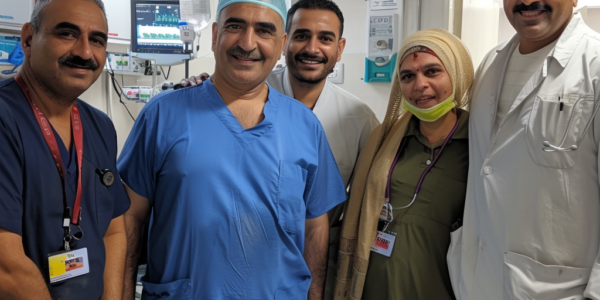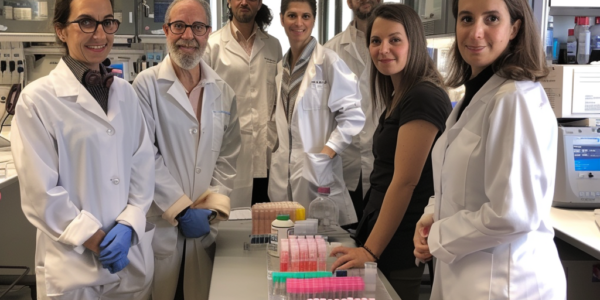Neoadjuvant Radiotherapy Shows Promise in Breast Cancer Treatment
Learn about the study evaluating the survival outcomes of neoadjuvant radiochemotherapy (NARCT) in early breast cancer patients undergoing breast conserving surgery (BCS) or immediate breast reconstruction (IBR). Discover how neoadjuvant radiation therapy (NART) compares to post-operation radiation therapy (PORT) in terms of breast cancer-specific survival (BCSS) and overall survival (OS) for patients aged 80 years or younger with unilateral T1-T4 invasive ductal breast cancer.
Yale Researchers Uncover Genetic Landscape of Neuroendocrine Tumors of the Cervix
Researchers from Yale School of Medicine have made significant strides in understanding the genetic landscape of neuroendocrine tumors of the cervix (NETc) to potentially improve treatments for this rare and aggressive disease. The study, published in the Proceedings of the National Academy of Sciences, unveiled novel genes and pathways that could pave the way for precision medicine approaches in treating NETc patients. Dr. Alessandro Santin emphasized the importance of genetic data in guiding the development of innovative therapies, suggesting a combination of common chemotherapy regimens with immunotherapies for a more effective treatment strategy.
Iraqi Man Overcomes Stage 4 Rectal Cancer with Complex Surgery in India
Iraqi man, 47, overcomes stage 4 rectal cancer after complex surgery in India. Misdiagnosed with piles, patient undergoes chemotherapy, radiation, and CRS and HIPEC procedures at Manipal Hospital. Despite initial poor prognosis, patient returns home with better quality of life, highlighting the effectiveness of advanced medical interventions in treating cancer.
AACR Annual Meeting 2024: Latest Advances in Cancer Science and Medicine
The AACR Annual Meeting 2024 in San Diego, California will feature presentations and discussions on the most recent developments in cancer research, with a focus on innovative treatments, diagnostic techniques, and advancements in understanding the underlying mechanisms of cancer. Attendees can expect to gain valuable knowledge and engage in discussions with experts, while the event will also provide networking opportunities for professionals and researchers to collaborate and exchange ideas. The ACC and Perelman School of Medicine at the University of Pennsylvania will be sharing cutting-edge research data, offering insights that could shape the future of cancer science and medicine. Follow @PennMedicine and @PennMDForum for real-time updates and insights from the event.
Stepped Collaborative Intervention Improves Quality of Life in Cancer Patients, Study Finds
A study published in The Lancet found that a stepped collaborative care intervention improved health-related quality of life for cancer patients with symptoms of depression, pain, or fatigue. The intervention included once-weekly cognitive behavioral therapy via telemedicine and resulted in significantly greater improvements in emotional, functional, and physical well-being compared to standard of care. The findings suggest potential benefits for integrated screening and care interventions in oncology settings.
Keytruda Shows Promising Results in Cervical Cancer Trial
Merck’s Keytruda has shown promising results in a recent cervical cancer trial, raising hopes for a broader FDA approval in the near future. The trial, known as KEYNOTE-A18, demonstrated that Keytruda, in combination with chemoradiotherapy (CRT), significantly improved overall survival (OS) in patients with earlier-stage cervical cancer. Keytruda’s previous FDA approval, granted in October 2021, allowed its use in combination with chemotherapy for the treatment of persistent, recurrent, or metastatic cervical cancer. However, this approval was subject to certain restrictions, including the requirement for tumors to express the PD-L1 biomarker at a combined positive score (CPS) of at least 1. The recent success of Keytruda in the KEYNOTE-A18 trial has reignited hopes for a broader FDA approval, potentially expanding the reach of this groundbreaking immunotherapy to benefit a larger population of cervical cancer patients.
Global Team Led by Dr. Yael Mossé Awarded Multimillion-Dollar Grant for Childhood Cancer Research
Dr. Yael Mossé and her global team have been awarded a multimillion-dollar grant to develop groundbreaking research in childhood cancer. The team aims to develop transformative new therapies for previously undruggable forms of childhood cancer, offering hope for improved treatment outcomes and quality of life for young patients.
Enobosarm Shows Promising Antitumor Activity in ER-Positive, HER2-Negative Advanced Breast Cancer
A recent study published in The Lancet Oncology has shown promising antitumor activity of enobosarm in patients with ER-positive, HER2-negative advanced breast cancer. The study assessed the activity and safety of enobosarm in women with previously treated locally advanced or metastatic breast cancer, with results showing potential benefits but also some drug-related adverse events. The study was funded by GTx, the original developer of enobosarm, and has implications for the potential role of androgen receptor modulation in cancer therapy.
MRI Monitoring Reduces Breast Cancer Mortality in Women with BRCA1 Mutations
An international study published in JAMA Oncology reveals that MRI monitoring in women with BRCA1 gene mutations significantly reduces breast cancer mortality without the need for preventive mastectomy. The research, including data from 2,488 women from 59 centers in 11 countries, highlights the importance of early detection and non-invasive monitoring techniques for managing breast cancer risk in high-risk women.
New Clinical Trial Shows Promise in Treating Certain Types of Mesothelioma
A recent clinical trial has shown promising results in the treatment of certain types of mesothelioma, a rare and aggressive form of cancer. The trial focused on a novel type of chemotherapy called pegargiminase, which has been found to improve the survival rates of patients with biphasic and sarcomatoid mesothelioma. The addition of pegargiminase to the standard chemotherapy treatment for nonepithelioid mesothelioma cases has emerged as a promising new approach, targeting tumors that lack argininosuccinate synthetase (ASS) expression. The results of this clinical trial represent a significant advancement in the treatment of mesothelioma, particularly for patients with biphasic and sarcomatoid cell types.










